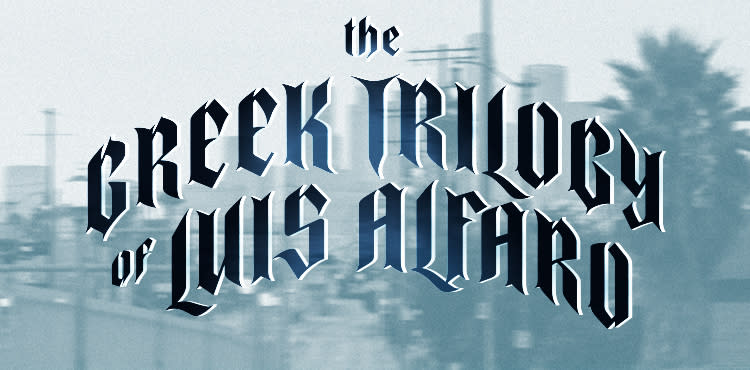From the Streets of L.A. to the Digital Stage
How CTG Gave New Life to ‘The Greek Trilogy of Luis Alfaro’

“I’m trying to hook up my headphones. They’re being a little testy,” says actress Sabina Zúñiga Varela during the first virtual rehearsal of Mojada, one of the three Greek plays Chicanx playwright Luis Alfaro has adapted. “This is going to be part of the process,” replied Juliette Carillo, the director. “Dealing with our little technical, bizarre Zoom hybrid world.”
Like Carillo and Zúñiga Varela, Alfaro did not foresee Zoom would become a saving grace for the artworld. Before the pandemic, the playwright was originally approached by The Getty with the idea to throw a launch party to celebrate the publishing of the collection, The Greek Trilogy of Luis Alfaro: Electricidad; Oedipus El Rey; Mojada. When they realized they could no longer hold public events, they proposed to have the works filmed and work with somebody to produce it.
Alfaro, who had worked closely with the Center Theatre Group over the years, shared the idea with Artistic Director Michael Ritchie who recalls “We immediately reacted with, ‘Sounds great. Let's start figuring out how we can do it and do it well.’”
It has been roughly seven months since the COVID-19 pandemic shut down businesses and entertainment venues in Los Angeles and shocked the theatre world into complete heartache. As Angelenos continue to grapple with the unknowns of this once in a lifetime phenomenon, Center Theatre Group discovered a way to overcome the grief and restore the arts: opening the curtains for the Digital Stage.
Serving as the fourth stage to the collective of venues under Center Theatre Group, the Digital Stage is a virtual home for a collection of new audio and video series for theatre lovers in Los Angeles and beyond. While the theatre company’s downtown L.A. theatres—the Ahmanson Theatre and Mark Taper Forum—remain dark, the Kirk Douglas Theatre in Culver City was transformed into a makeshift film studio to record a set of new multi-camera, virtually produced readings and productions, for a series called: Live from the KDT.
Presented in partnership with The Getty, The Greek Trilogy of Luis Alfaro, three plays inspired by Chicanx culture the series including Oedipus El Rey (adapted from Sophocles’ Oedipus the King), Mojada (adapted from Euripides’ Medea) and Electricidad (adapted from Sophocles’ Electra) have been captured on the stage of the Kirk Douglas Theatre. In the plays, Alfaro takes Greek tragedies and transports them to the familiar streets of Los Angeles, a diverse city whose Latinx community makes up almost half the population. Rather than mere adaptations, they become counterparts to the Greeks centering on the experiences of the Chicanx and the wider Latinx communities.
Although previously performed across theatres around the world as individual plays, this will be the first time the entire trilogy of Chicanx adaptations will be read together. Alfaro believes an environment can play its own character and is conscious that his plays are speaking the language of Los Angeles. One of the characters in Mojada is a pan dulce vendor, and beloved Laker Lebron James even gets a nod, via a jersey worn by a character.
“I really like writing about places,” Alfaro says. “It tells you a lot about how people love and think and live.”
As an L.A. native, Alfaro’s close connection to Center Theatre Group goes beyond his years working there as a resident artist. In his youth, he worked as an usher at the Ahmanson and Taper.
“I was really into Blues music,” the Chicanx playwright reminisces. His parents began taking him to concerts and theatre at a very young age. “I was a little eccentric kid.”
Alfaro’s mother was committed to indulging his love of the arts by dropping him at theatres all around Los Angeles while she waited for him in the car. He then began going to The Music Center. “Eventually, I think it was my dad that said, ‘You got to get a job here because this is way too expensive.’”
We still don’t know when we will be able to gather as a community in theatres, but the playwright remains positive about the challenge of change and embraces it. “I feel like this great pause is also for us artists, a great possibility,” he says. “How do we reinvent this thing? So that it's not about how we stopped, but it's about how we kept going? Or how we started to do something new? How we came back to our industry with new ideas, but not only new ideas, new people?”
The pandemic has taken so much from the theatre community this year, but fear not, the show is just getting started.
Center Theatre Group’s Digital Stage will feature a series of streamed performances, community conversations, and its ever-expanding library. For more information, visit CenterTheatreGroup.org/DigitalStage.
